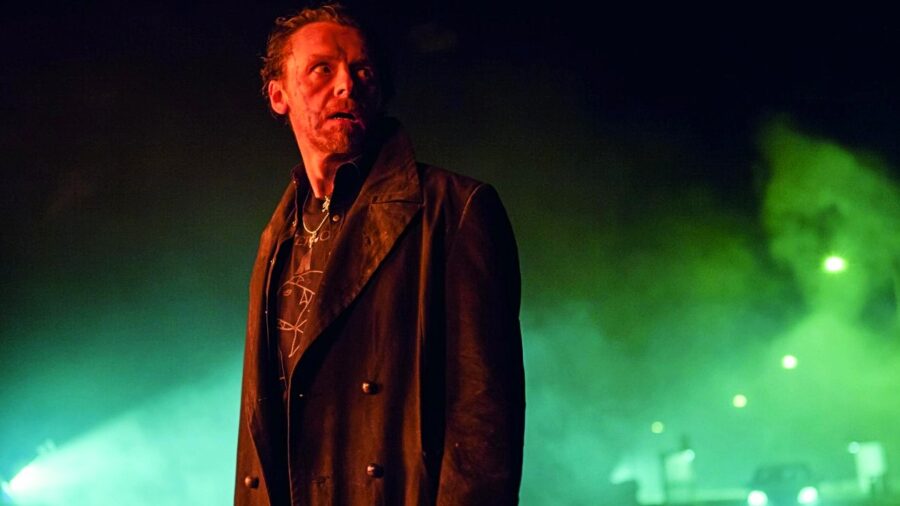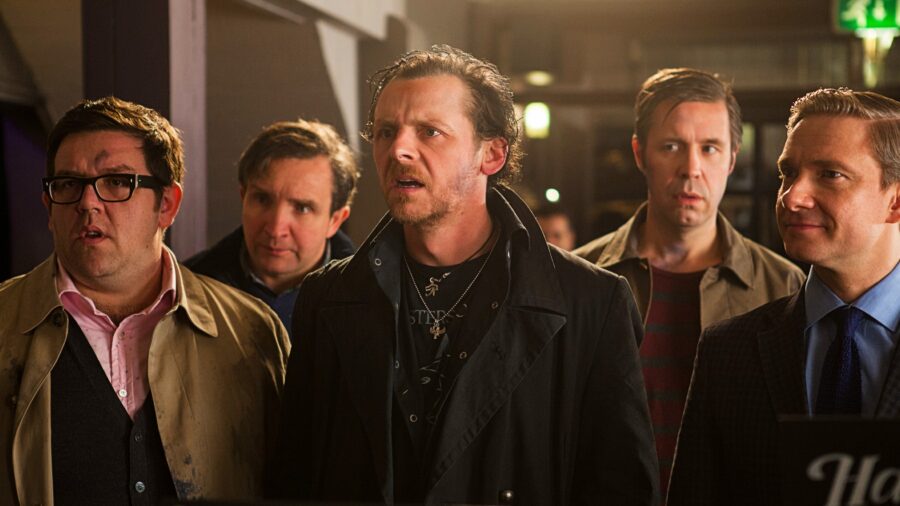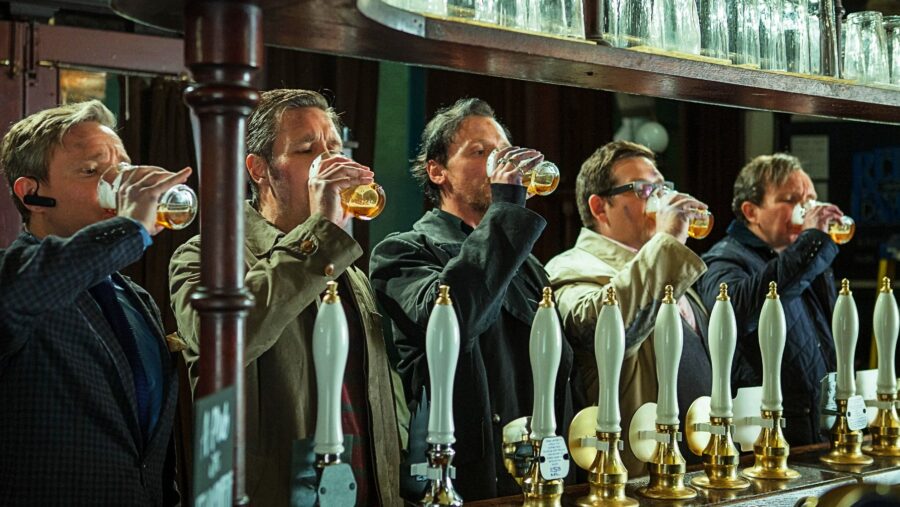The World’s End Is Edgar Wright’s Best And Most Pessimistic Movie
The World's End concludes the Cornetto Trilogy with a dark warning that not everyone can grow up.

Over a decade ago, filmmaker Edgar Wright created his most celebrated work, a series of films dubbed the Three Flavours Cornetto trilogy, interrupted only by the commercial disappointment and artistic success of Scott Pilgrim vs. the World. Despite being linked by nothing more than references to the titular European packaged ice cream brand and the duo of Simon Pegg and Nick Frost, the films instantly became classics, loved as much for their themes of supportive friendship as their genre pastiches. The World’s End, the final installment in Edgar Wright’s trilogy, is not only the best of the three (and his career thus far) but also a dark, bleak rebuttal of everything that came before them.
The plot of The World’s End can be summed up remarkably succinctly. Middle-aged former cool kid Gary King (Simon Pegg) rounds up his reluctant childhood friends (Nick Frost, House of the Dragon’s Paddy Considine, The Hobbit’s Martin Freeman, and Sherlock Holmes’ Eddie Marsan) to finish a pub crawl in their hometown. However, plans to do so are complicated by the fact that their quaint English village has been overrun by invading aliens who have replaced virtually every inhabitant with artificial constructs with weird blue goo for blood.

The World’s End was released in 2013 to much fan anticipation, following the zombie riff of Shaun of the Dead and the buddy cop homage Hot Fuzz. This time around, Edgar Wright (who co-wrote the script with Simon Pegg, based on a story he came up with at 21) set his aims on the alien invasion genre. Essentially, The World’s End is Edgar Wright’s riff on science fiction movies like Invasion of the Body Snatchers and Attack the Block (which he executive produced and had a cameo in), but with a whole lot of drinking.
The first hint of something having changed in The World’s End from previous Edgar Wright movies is the role swap for Simon Pegg and Nick Frost. In both Hot Fuzz and Shaun of the Dead, Pegg played a straight-laced character struggling against a world in which he can’t seem to find a place, while Frost was the easy-going schlub of a friend. This time around, things are reversed, with Frost playing an uptight businessman dealing with his alcoholic screwup of a childhood friend, Pegg.
While the role reversal in The World’s End might be just a fun little twist on Edgar Wright’s established tropes, it runs deeper and darker than that. The clear central theme of the Cornetto trilogy is young men struggling to mature into better versions of themselves. Shaun fights zombies but also becomes a better boyfriend. Nicholas Angel learns that having friends is better than being a robotic supercop. But in The World’s End, Edgar Wright’s characters hit their limit and can go no further.

Throughout The World’s End, Simon Pegg’s character is obsessed with completing a pub crawl from decades earlier; it turns out that he is desperate to experience the feeling of youthful optimism, before he became the broken, alcoholic, suicidal man that he is. That alone would make it by far the darkest installment of the trilogy, but The World’s End and Edgar Wright don’t stop just at showing the bleak, lonely consequences of a person unable to find a way to grow up. They burn down the whole world.
The World’s End is a title to be taken literally. By the end of the film, Simon Pegg’s drunken insouciance has caused Earth to be ostracized from a galactic community that seeks to uplift humanity (at the cost of some of our species’ unique barbarity). The withdrawal of the invading aliens causes a total meltdown of human technology and civilization, reverting the entire world to a new Dark Age. But that doesn’t matter to Simon Pegg’s character, because he gets everything he wanted: to be a child again.
The film ends with Simon Pegg’s Gary King reunited with artificial constructs of his childhood buddies, once again the big man of a group of teenagers. However, this time, they’re not ruling the local high school, they’re battling post-apocalyptic warriors in a ravaged world full of new forms of prejudice and not a Cornetto to be seen.
The World’s End frames this as a kind of happy ending, which is Edgar Wright’s tragic coup de grace. Gary King might be sober and happy in his own way, but in order for that to happen, he literally had to destroy the world. And while Simon Pegg’s previous characters found a way to move forward with their lives, Gary, King of the Humans, has completely failed to do so and reverted to a childish (literal) fantasy world.
It’s an unexpected end to a generally positive, light-hearted trilogy of films. None of the Cornetto films can be called “realistic” by any means, but The World’s End subtly acknowledges that not everyone is going to be able to grow up and become an adult. For some people like Gary King, the world is such a painful place that it needs to be done away with entirely.












